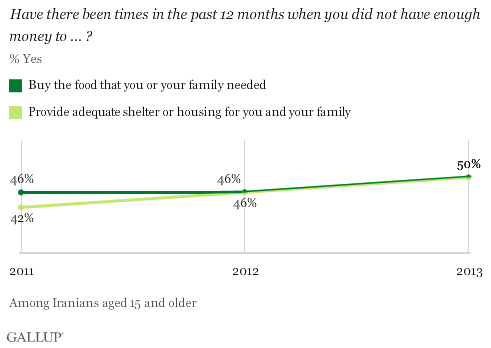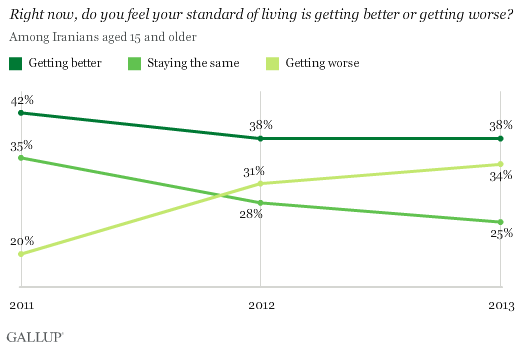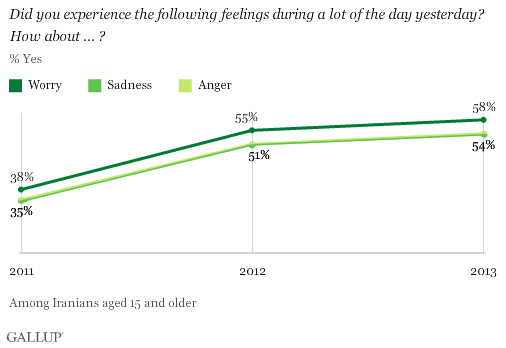WASHINGTON, D.C. -- Iranian residents' election of moderate cleric Hassan Rouhani to the presidency has been widely interpreted as evidence of their desire for meaningful change in the country. Rouhani will preside over an increasingly distressed population: Half of Iranians say there have been times in the past year when they have had trouble paying for adequate shelter and for food their families needed. In each case, the 50% figure is the highest among 19 populations in the Middle East and North Africa region that Gallup surveyed in 2012 and 2013.

Many Iranians have felt the effects of international sanctions targeting Iran's nuclear program, which have expanded considerably over the past two years. For instance, in 2011, the European Union imposed an oil embargo that has cost the Iranian government billions of dollars in oil revenue each month. Most recently, U.S. President Barack Obama authorized his administration's ninth round of sanctions on June 3 targeting the use of Iran's currency by foreign financial institutions. The cumulative result has been to destabilize the Iranian economy, producing rampant inflation and spiraling unemployment. Gallup's data indicate that 27% of Iranians in the workforce are currently unemployed, and an additional 34% are underemployed.
Half of Iranian adults now say sanctions have personally hurt their livelihoods a great deal, while an additional 35% say their livelihoods have been hurt somewhat. This view reflects Iranians' declining optimism about their living standards. The 34% of Iranians who in 2012 said their standard of living is getting worse is up from 20% in 2011.

Gallup trends also reveal that Iranians' emotional well-being has deteriorated over the past two years. Currently, more than half say they felt a lot of worry (58%), sadness (54%), and anger (54%) during much of the day prior to the interview. All these figures have risen substantially since 2011 and are now among the highest in the region.

Implications
Widespread economic hardship among the Iranian people carries mixed implications for the future of relations between Washington and Tehran under President Rouhani. Some Western leaders may take it as a sign that international sanctions are working and should be maintained. However, as U.S. officials, including former Secretary of State Hillary Clinton, have claimed, the Iranian people themselves are not the target of sanctions. What's more, Gallup finds that most Iranians -- currently 68% -- still support the country's efforts to develop its nuclear capabilities. Additionally, the head of the United Nations International Atomic Energy Agency recently reported no signs that sanctions have slowed down Iran's nuclear program.
The rising prevalence of anger in Iran may be particularly troubling to U.S. leaders. Almost half of Iranians (46%) say they hold the U.S. responsible for the international sanctions on their country, while 13% blame their own government. These opinions raise the question of the extent to which increasing hardship may be bolstering anti-U.S. sentiment in a country that, despite its economic troubles, has been an increasingly assertive power in the region. Currently, 15% of Iranians say they approve of U.S. leadership; though this represents a slight improvement from 9% in 2011, it remains one of the lowest figures in the Middle East and North Africa region.
For complete data sets or custom research from the more than 150 countries Gallup continually surveys, please contact us.
Survey Methods
Results are based on telephone surveys of Iranian adults, aged 15 and older, conducted in February-March 2011 (1,003 interviews); January 2012 (1,000 interviews); December 2012-January 2013 (2,507 interviews), and May-June 2013 (1,000 interviews) in Iran. For results based on the total sample of national adults, one can say with 95% confidence that the maximum margin of sampling error is ±3.8 percentage points. The margin of error reflects the influence of data weighting. In addition to sampling error, question wording and practical difficulties in conducting surveys can introduce error or bias into the findings of public opinion polls.
For more complete methodology and specific survey dates, please review Gallup's Country Data Set details.
